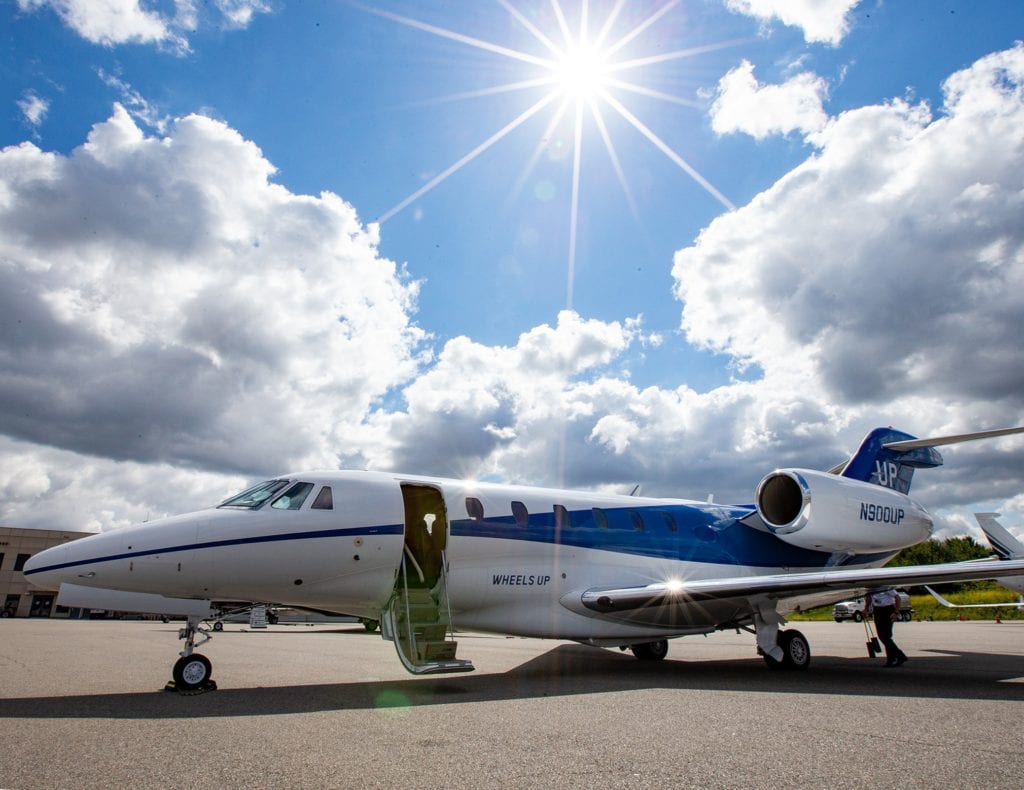
Wheels Up is acquiring a new flight management systems technology provided by Avianis. Photo: Wheels Up
Private aviation company Wheels Up acquired “certain material assets” of Avianis Systems, LLC, a provider of an advanced flight management system (FMS), as part of a strategy that Wheels Up believes will eventually lead it to a ten-figure valuation. The transaction is expected to close later this month.
Wheels Up Founder and CEO Kenny Dichter, speaking at Revolution.Aero in San Francisco, laid out his company’s strategy to use digitization and automation to increase both his company’s revenue and its revenue multiple, which was last placed between 2.2x and 2.5x on 400 million annual revenue.
“It’s the digitization, it’s the automation, and it’s the organization of our assets,” Dichter said. “[Business jets] are the most under-utilized assets in the world, except maybe yachts.”
Moving closer to a revenue multiple that technology companies like Uber and AirBnB often see isn’t accomplished “with your own assets … you have to organize the five or ten thousand airplanes in the world, and you need to deliver them in a safe way to the end users out there … you need to organize the back-end, and technology is going to do that,” Dichter said.
Avianis’ FMS is a critical part of that plan, as Wheels Up moves from a fleet-focused to an asset-light — or “asset-right,” as its executives call it — company, offering a single platform where many bizjet operators can integrate, digitize and normalize their business operations. Wheels Up’s digital charter marketplace will connect customers with a real-time supply of safety-vetted and verified aircraft, increasing their options as well as offering competitive pricing.
“As we started to grow the supply side … to do that effectively, you have to really integrate their whole business internally and in one platform, from billing to expenses to flight schedules to crew regulatory to maintenance, all of the things that really make up the operator business,” said Daniel Tharp, founder and managing director of Avianis who will be joining the Wheels Up team.

Here, Avianis provides an overview of the flight management system and other capabilities that it provides. Photo: Avianis
The team plans to combine Avianis’ tools and expertise and with Wheels Up’s focus on a frictionless, transparent end-user interaction to accelerate the development of its digital platform that will streamline operations for participating bizjet operators via post-booking automation tools as well as moving towards an Uber-like experience for end-users.
“We want to run our business on this software and make it more efficient,” said Dan Crowe, CIO and EVP of digital at Wheels Up. “There’s also the whole marketplace, a digital platform that we’re building, which is connecting … the high-fidelity data that [Tharp] and his team have got a great way to do that from a direct connection from the operator to our marketplace. And then the marketplace platform itself, some of the actual components around pricing, feasibility, availability, some of our optimization and data science technology that Wheels Up will bring to the party.”
In 2025, Wheels Up “is going to be a lot closer to the true, frictionless, digital experience that we’ve come to expect in all other aspects of our lives,” said Crowe, describing hybrid options to address first-mile and last-mile travel as an example. “Far superior consumer experience, a lot more choice and convenience, just like you see in other industries.”
“We’re going to aggregate demand. We’re going to help consolidate supply either virtually or physically, and we’re going to put it on an advanced digital platform and Avianis is going to be the intel inside for a lot of it,” Crowe added.
The company also aims to leverage many of the cost-saving elements of digitization, as well as ride-sharing capabilities, to lower the cost of access to private aviation and convert more first-class airline flyers to private flyers.
Other business jet operators that spoke at Revolution.Aero were skeptical of efforts to lower the cost of private aviation, having seen no change in the fundamental economics of the business aside from pooling, which one operator said “in some cases it works, in some cases it doesn’t.”
“I don’t see step-change improvements in the cost to go where you want to go when you want to,” said Andrew Collins, president of Sentient Jet.
But the Wheels Up CEO is adamant that the demand is there. “Humans are hard-wired to want to fly privately,” Dichter said. “When I look at the world, I see 7.5 billion private flyers who haven’t flown privately yet.”